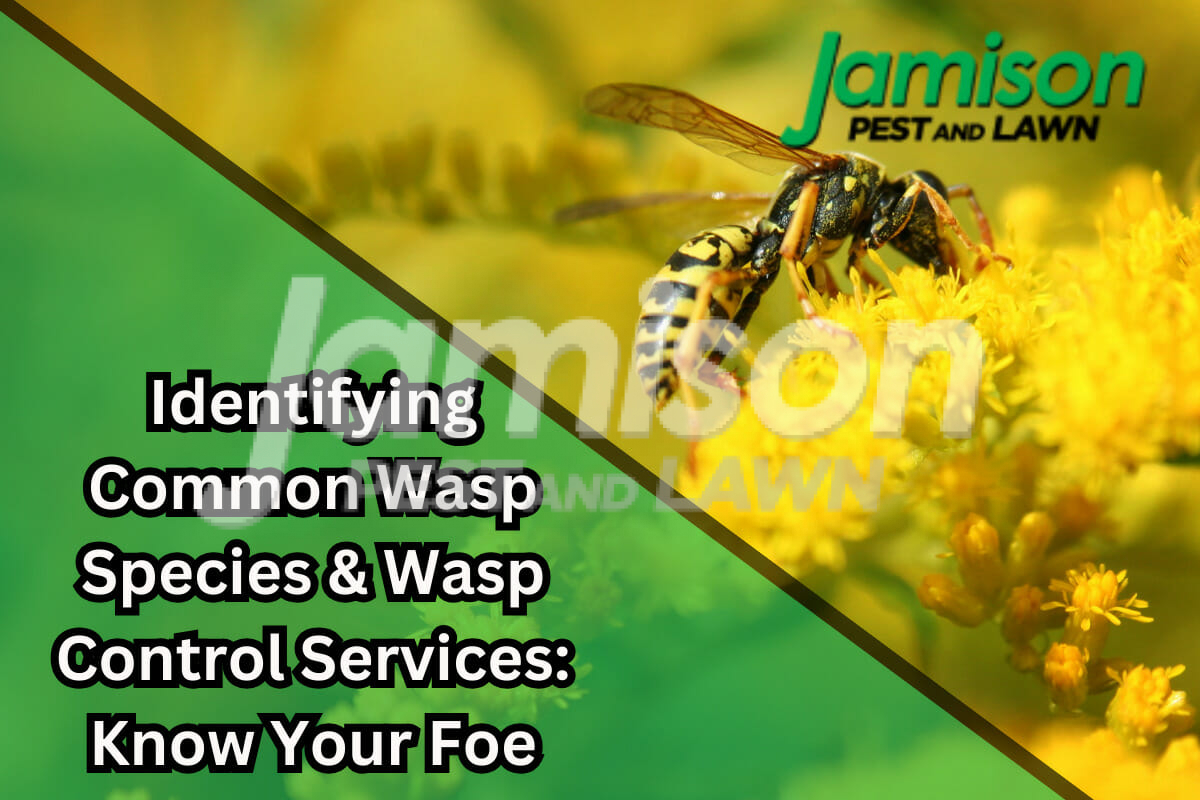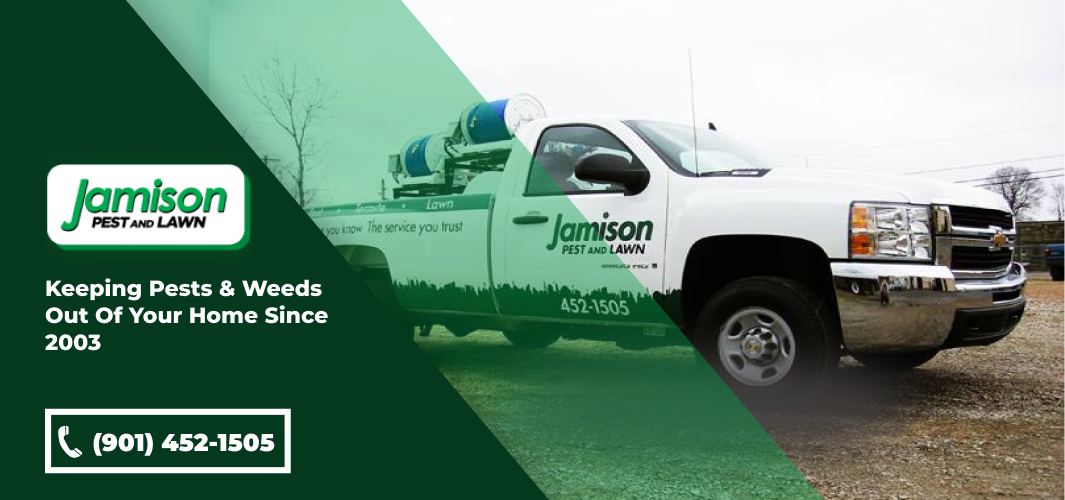In this blog post, we’re discussing a not-so-friendly creature, wasps! A wasp infestation can quickly turn your outdoor gathering into a nightmare, and for those with allergies, it can pose a serious threat. To effectively deal with these pests, you need to know your enemy. Luckily, in this article, we’ll discuss some common wasp species you might encounter and the wasp control services available to keep them at bay.
What Are Wasps?
If you’ve ever encountered a wasp, you know how terrifying it can be! These creatures are a type of insect belonging to the Hymenoptera family, which includes bees and ants. Wasps are known for their distinctive appearance, with slender bodies, colorful markings, and a pair of wings. They play a crucial role in pollination and crop pest control, making them essential for maintaining the balance of ecosystems.
However, when it comes to wasps, it’s important to remember that they can also be a nuisance and threaten human health. That’s why it’s crucial to have effective measures in place to prevent wasp infestations and ensure the safety of your home.
Why You Need To Know About Wasp Behavior and Habits
Wasps are social insects that live in colonies, and each species exhibits unique behavior. Some are scavengers, while others are predators. Understanding their habits can aid in identifying the species and anticipating their movements.
Common Wasp Species That Can Affect Your Property
Yellow Jackets
Yellow jackets are the ultimate picnic crashers. These small insects have a flashy combination of yellow and black colors and are also known to construct their nests underground. Their aggressive temperament often makes them unwelcome guests during outdoor activities.
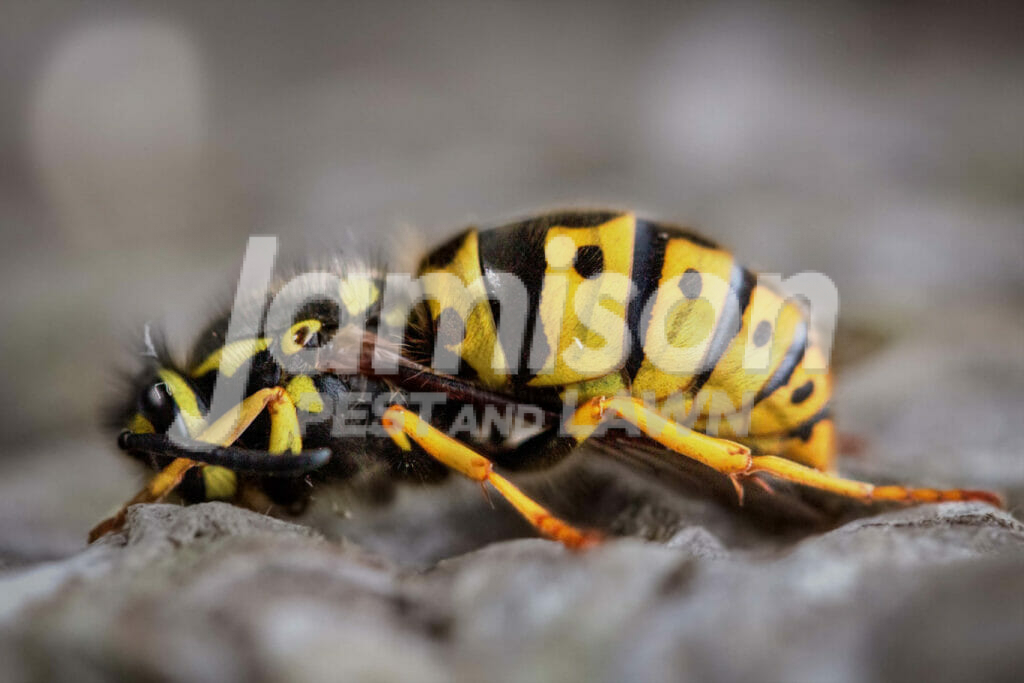
Paper Wasps
Paper wasps have earned their name from the paper-like nests they craft. With long, slender bodies, they are generally less aggressive than yellow jackets. However, provoking them can result in painful stings.

Hornets
Hornets are the giants of the wasp world. Larger and more aggressive than their counterparts, they prefer to build their nests in high locations like trees or below the eaves of your roof.
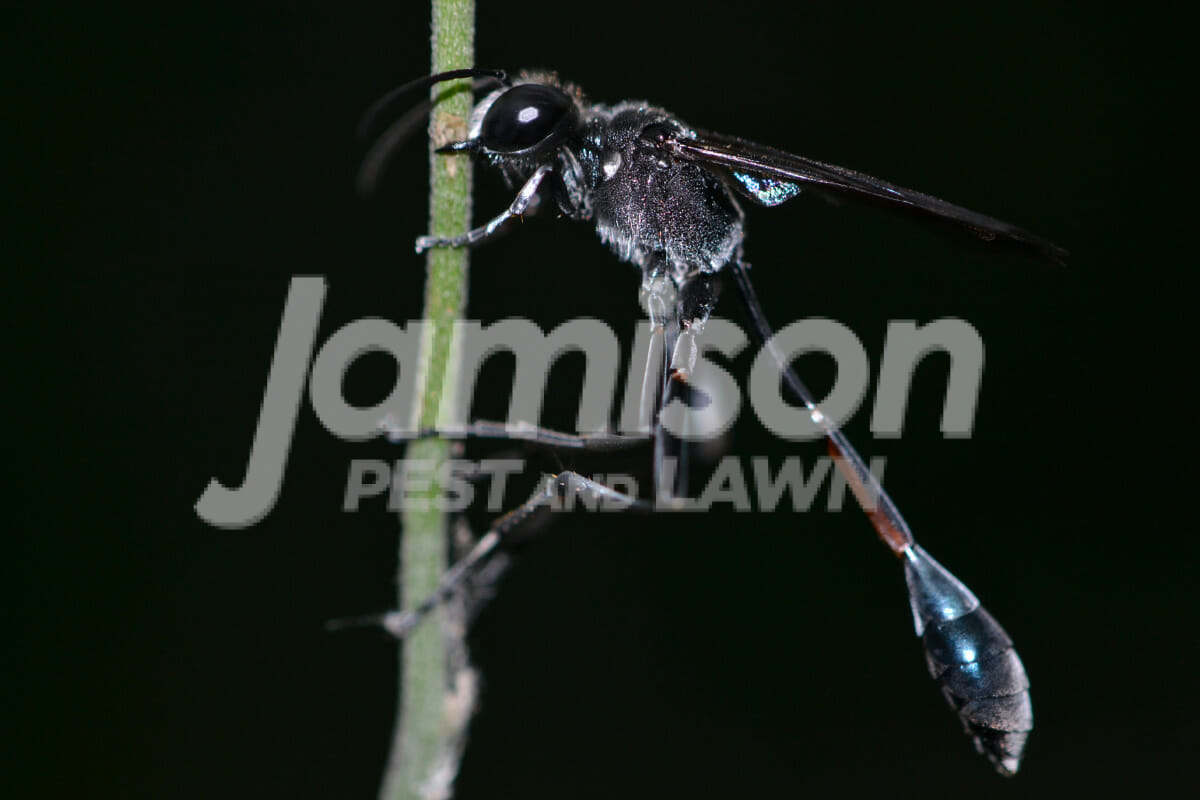
Mud Daubers
Mud daubers are a unique type of wasp that is usually solitary, and create their tube-shaped nests from mud. Unlike their aggressive counterparts, they are generally peaceful creatures and are vital in controlling other insect populations.

Bald-Faced Hornets
Despite their name, bald-faced hornets are a type of yellow jacket. They are easily recognized by their black and white markings. These wasps build large, paper-like nests as high as 60 feet, often hanging from trees or structures. They are highly territorial and can be extremely aggressive when their nest is threatened.
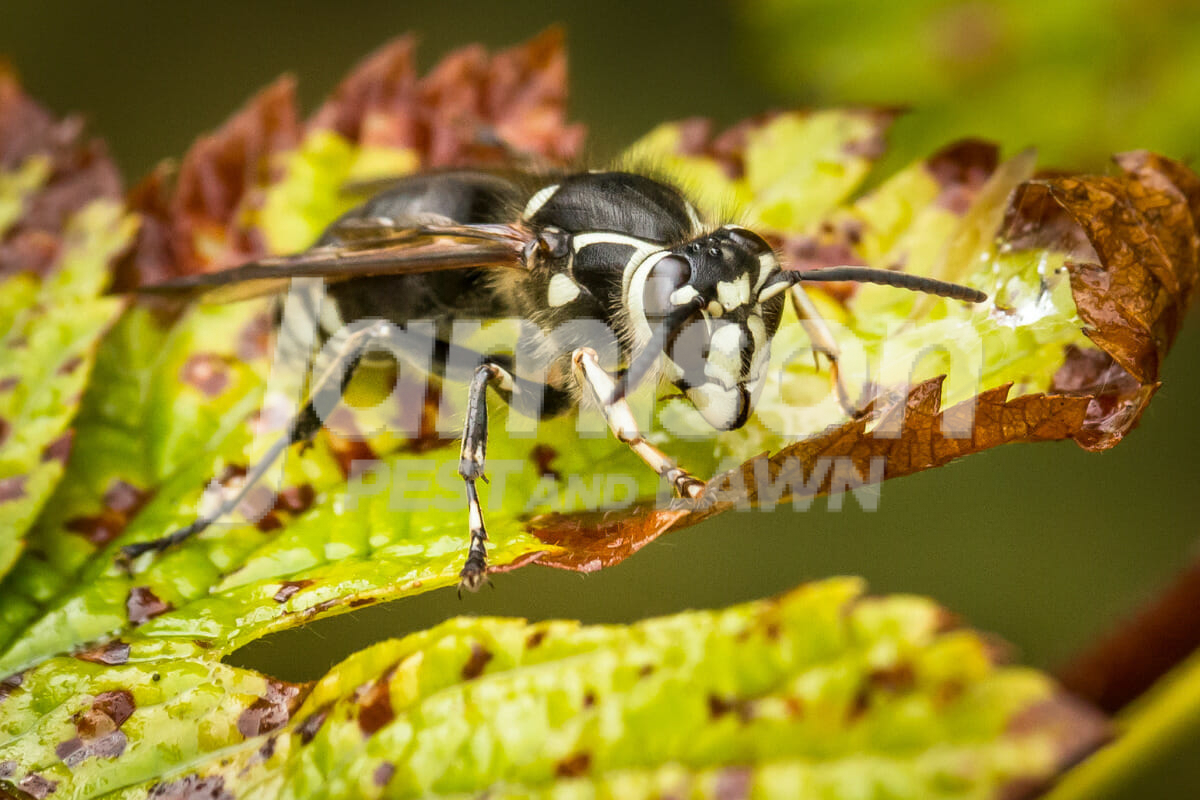
Cicada Killers
Cicada killers are solitary wasps known for their large size. They usually have a brown or black abdomen with yellow markings. Due to similar markings, they can be mistaken for hornets as well. However, cicada killers get their name because they prey primarily on cicadas, using them to feed their larvae. While they may look intimidating, they are generally not aggressive towards humans unless provoked.

Identifying Wasps
Wasps are a diverse group of insects, and being able to identify them correctly is essential for effective wasp management. Now we’ll explore key ways of identifying these buzzing insects.
Physical Characteristics
Color and Markings
One of the first steps in identifying a wasp is to observe its colors and markings. Different wasp species exhibit distinct color patterns. For instance, yellow jackets typically have a combination of yellow and black, while paper wasps often display various shades of brown and yellow.
Body Shape and Size
Wasps have slender bodies with a narrow waist, which distinguishes them from bees. Their size can vary significantly between species.
Nest Appearance and Location
The characteristics of a wasp nest can provide valuable information about the species. As described before, mud daubers can be identified by their tube-like nests, while other wasps, like hornets, create paper-like structures below the eaves of roofs or on tall trees.
How Do You Get Rid Of Wasps? Effective Ways To Keep Your Home Wasp-Free
Dealing with a wasp infestation can be daunting, but there are effective methods to keep these stinging insects at bay. You can choose between natural and chemical approaches based on your preferences and the severity of the infestation.
Chemical Wasp Control Methods
Insecticide/Wasp Spray
If you are looking for a quick method to remove wasps then you can try a wasp spray. These sprays can effectively eliminate bigger infestations and work very well with wasp nests.
To make sure you get the best outcome, always follow the product instructions and wear protective clothing when using chemical sprays. Though the products used today are typically safe, it is still helpful to keep children and pets away when you use these sprays.
Natural Wasp Control Methods
Wasp-Repelling Plants
Planting specific herbs and flowers can work wonders in deterring wasps from invading your outdoor space. In our other blog posts, we have seen how natural repellent helps deter rodents, but the same is true for wasps as well.
Here are three powerful options:
Mint: The robust scent of mint acts as a natural wasp repellent. By strategically planting mint around your outdoor seating areas, you create a protective barrier that keeps these insects at bay.
Lavender: The delightful aroma of lavender is not only pleasing to humans but also a potent wasp deterrent. Placing potted lavender near entry points to your home effectively discourages these unwelcome visitors.
Marigolds: While marigolds enhance the beauty of your garden, they also serve as an aromatic shield against wasps. Their strong scent repels these insects, making your outdoor experience more enjoyable and wasp-free.
DIY Wasp Traps
Using wasp traps is a clever and environmentally conscious method to maintain a wasp-free outdoor space. There are wasp traps available online, but there are other options too.
Crafting these DIY traps is simple; you only need empty plastic bottles, sweet baits like fruit juice or soda, scissors, and twine. By constructing a funnel inside the bottle and filling it with tempting bait, you create an irresistible lure for wasps.
Other Preventive Methods To Keep Wasps Away
Keep Food And Drinks Covered
Wasps are attracted to sugary and savory foods. When dining outdoors, use lids or covers on food and beverages to prevent wasps from being attracted to your meals.
Seal Entry Points
Conduct a thorough inspection of your home’s exterior and seal any cracks or openings that could serve as entry points for wasps. This includes gaps around windows, doors, and utility openings.
Remove Attractants
Regularly clean outdoor grills, picnic tables, and garbage cans to eliminate food residue that might attract wasps.
Professional Wasp Control Services
When it comes to tackling a significant or potentially hazardous wasp infestation, there’s no substitute for the expertise and resources that professional wasp extermination services can offer you. While DIY methods can suffice for minor issues, severe infestations or nests located in hard-to-reach places demand the attention of trained pest control professionals.
Advantages Of Hiring A Local Wasp Control Expert
Expertise:
Local wasp control professionals have the knowledge and experience to accurately identify the wasp species, locate nests, and implement effective eradication methods.
Safety:
Dealing with wasp nests, especially in hard-to-reach areas, can be dangerous. Professionals have the necessary safety equipment to handle the task without risking stings.
Long-Term Solutions:
Pest control experts not only eliminate current infestations but also provide preventive measures to reduce the risk of future wasp problems.
Efficiency:
Professionals use specialized tools and more potent and effective insecticides than over-the-counter products.
Jamison Pest and Lawn: The Go-To Name For Wasp Pest Control
In the above section, we discussed how hiring professionals is your best bet when you want to eliminate wasps. If you are also wondering who is the best professional to call for wasp control near me, look no further than the team at Jamison Pest and Lawn.
We offer exceptional wasp control services in Memphis and the surrounding areas of Tennessee. With 77 years of combined industry experience, and a pest control program to help you all year round, our team is ready to help you out with our best-in-class commercial and residential pest control and lawn care services.
Don’t let wasps disrupt your outdoor activities or pose a threat to your family—contact us today at (901) 452-1505 for a customized solution tailored to your needs!
FAQs
A. Look for increased wasp activity around your home, especially near nests. Frequent sightings of wasps indoors may also indicate an infestation.
A. You can attempt DIY removal for small nests, but it’s safer to hire professionals for larger or hard-to-reach nests.
A. Early morning or late evening is ideal, as wasps are less active during these times.



